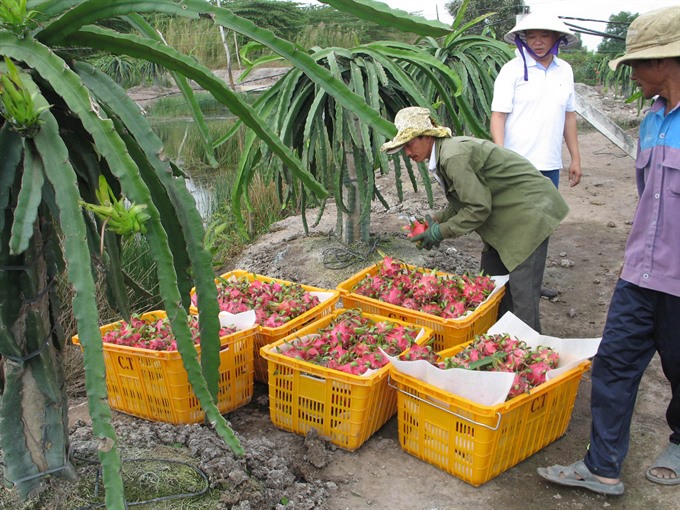 Society
Society

The Đồng Tháp Mười (Plain of Reeds) area in the Mekong Delta, known for its agricultural prowess, is in need of major agricultural reform to reach its true potential, experts have said.
 |
| Dragonfruit being harvested by farmers of Cát Tường agriculture company in Thạnh Tân Commune, Tân Phước District of the southern province of Tiền Giang. — VNA/VNS Photo Minh Trí |
MEKONG DELTA — The Đồng Tháp Mười (Plain of Reeds) area in the Mekong Delta, known for its agricultural prowess, is in need of major agricultural reform to reach its true potential, experts have said.
Authorities in the Plain of Reeds region, which spans Long An, Tiền Giang and Đồng Tháp provinces, have been dealing with the effects of climate change and rising sea levels, including drought, floods and saltwater intrusion.
Last year, for example, salt intrusion affected around 10,000 hectares of rice crops in the region.
At a conference about the effects of climate change on the Mekong River, Dr Nguyễn Văn Khang, chairman of the Tiền Giang Union of Science and Technology Association, said that increased demand for hydroelectricity was affecting the flow of the Mekong River, leading to a drop in silt, an important element for soil fertility.
Trương Hữu Trí, director of the Gò Gòn Farmer Cooperative in Long An Province’s Tân Hưng District, said that officials must work to train farmers about new farming techniques since some of them were still reluctant to use advanced technology.
Many farmers are also pursuing inefficient methods. For example, pineapple farmers in Tiền Giang Province’s Tân Phước area, well-known for pineapple cultivation, have not made enough profit during this year’s harvest season.
Đặng Văn Hòa, a pineapple farmer, said: “Traders are only paying VNĐ1,500–4,500 for each pineapple, which is a lot lower than the mid-year price. Most of us can only break even.”
Although demand for pineapples continues to be stable, the spike in output during the peak season has resulted in lower prices.
Farmers have been urged by Hậu Giang Province’s Department of Agriculture and Rural Development to join farmer cooperatives and spread the harvest throughout the year, rather than harvesting the entire area at the same time.
Đào Văn Hồ, director of the Việt Nam Trade Promotion Centre for Agriculture, said that more modern technology and better farming techniques should be used to cut costs and improve productivity as well as the quality of goods.
According to Hồ, the increased demand for high-quality products has led to a need for a better agricultural value chains. Distribution channels that keep track of the origin of crops, for example, are needed to ensure health standards, while regional markets need to be more standardised to ensure quality standards.
Reform measures
At a recent conference about Đồng Tháp Mười’s agricultural development, Dr Đặng Kiều Nhân from the Mekong Delta Development Research Institute said that industrial and service sectors must be involved in agricultural reform and be a part of the value chain, including producing a wider variety of processed products for different market segments.
Environmental protection and infrastructure development are also needed to improve the region’s agriculture, Nhân added.
At the conference, Lê Văn Hoàng, director of Long An Province’s Department of Agriculture and Rural Development, said that more research on better-yielding crops is needed to replace low-yielding crops now being cultivated.
Đồng Tháp Province was chosen for a pilot run to test agricultural reform policies three years ago, which included the application of modern technologies and farming techniques, promotion of processing of goods, and selection of better crops for cultivation and export.
The province has also encouraged farmers to form social clubs to share farming techniques.
Trần Văn Bình, president of a social club in Tân Quy Đông District, said: “Previously, some households kept their secrets and techniques to themselves, but now all members of the club share their knowledge and learn from each other. So a lot of households have benefited.”
Farming experts have also been helping connect farmers with better distribution channels and educate them about new techniques and market demand.
Officials in the area are looking to apply these policies to the rest of the Plain of Reeds region. — VNS




